#Queen of egypt
Explore tagged Tumblr posts
Text

Berenice, Queen of Egypt
Artist: Anthony Frederick Augustus Sandys (British, 1829-1904)
Date: 1867
Medium: Oil on canvas
Collection: Private collection
#paintingg#pre raphaelite movement#art#berenice#queen of egypt#woman#queen#british culture#purple gown#long hair#foliage#british art#oil on canvas#artwork#fine art#oil painting#sandals#full length#frederick sandys#british painter#european art#19th century painting
130 notes
·
View notes
Text


Leontyne Price as Cleopatra in Barber's ‘Antony and Cleopatra (1966)’ — The Met Archives/Metropolitan Opera
#leontyne price#samuel barber#antony and cleopatra#cleopatra#queen of egypt#the met#opera#musical theater#1960's#💎
297 notes
·
View notes
Text
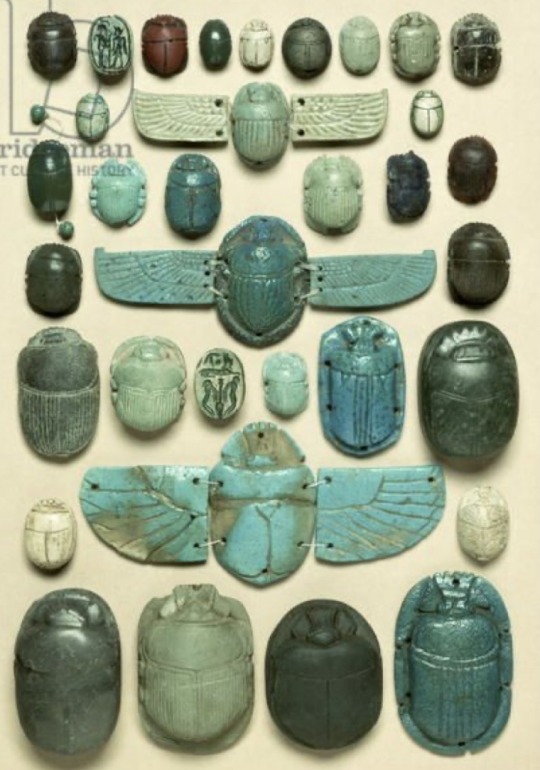
#ancient egypt#cleopatra#egypt#egyptian#egyptian aesthetic#egyptian antiquities#egyptian art#egyptian royalty#eqyptian architecture#queen of egypt#cleopatra makeup#cleopatra worship#cleopatra aesthetic#egyptian scarab#egyptian pharaoh#egyptian cats#egyptian statue#egyptian jewelry#egyptian cat#egyptian pyramids#ancient egyptian#scarab#khepera jewelry#khepera#turquoise#turquoise scarab#turquoise khepera#Egyptian beetle
213 notes
·
View notes
Text

« Cleopatra testing poisons on condemned prisoners », Alexandre Cabanel, 1887.
36 notes
·
View notes
Text








A Classic Tale of Tragic Romance
The play All for Love or the World Well Lost was penned in blank verse by English poet and playwright John Dryden (1631-1700) in 1677, a significant work for Dryden and a notable contribution to the genre of heroic tragedy, with many scholars considering it one of Dryden's finest works. Our copy is from an edition printed in London for Jacob and Richard Tonson in 1740 (although the handwritten information on the paper wrapper says 1750).
The play is an acknowledged reimagining of Shakespeare’s Antony and Cleopatra, which focuses on the last hours of the lives of its hero and heroine’s tumultuous relationship. Set in Alexandria, Egypt, the play follows the tragic love story of Marc Antony and Cleopatra, queen of Egypt, as they struggle to overcome political intrigue, jealousy, betrayal, and their own personal demons. The play explores themes of love, honor, duty, and the struggle between reason and passion. Ultimately, the play ends with the tragic deaths of Antony and Cleopatra, who choose to die together rather than live apart.
John Dryden was an accomplished English poet, literary critic, translator, and playwright, and in 1668 became the first Poet Laureate of England. He stated that writing this play was his attempt to reinvigorate serious drama. Dryden's play, with its exploration of complex themes and its reimagining of a classic work, was a bold and innovative contribution to the theatrical landscape.
The Tonson publishing firm was a powerhouse of London publishing for nearly a century. It was founded in 1677 by Jacob Tonson the Elder (1655-1736), who formed a close association with Dryden, publishing much of his work in the final decade of Dryden's life. In 1709, Tonson secured the publication rights to Shakespeare's works, and a year later, in partnership with his nephew Jacob Tonson II (1682-1735), he moved his shop to Shakespeare's Head in the Strand. The Tonsons' signature emblem was a small woodcut image of the Bard, commonly found on their title pages as seen here. The Tonsons listed as the publishers of this booklet are the elder Tonson's great-nephews, Jacob Tonson III (1714–1767) and Richard Tonson (1717-1772), the last of the Tonson publishing clan.
View other Classics posts.
-Melissa, Special Collections Classics Intern
#classics#ancient egypt#roman#cleopatra#Queen of egypt#marc antony#cleopatra vii#tragedy#john dryden#All for Love or the World Well Lost#doomed love#tragic ending#shakespeare#lovers#love#antony and cleopatra#Jacob Tonson#Richard Tonson#plays#melissa
30 notes
·
View notes
Text

#culture#egypt#egyptian#ancient egypt#egyptian culture#nefertari#nefertari meritmut#queen#africa#queen of egypt#egyptian queen
39 notes
·
View notes
Text




#history#Reina tany#Tany#tany#reina de egipto#queen of egypt#ancient egypt#egyptian#egypt queen#brazilian#brazilian actress#brazil#jose de egito#jose de egypto
30 notes
·
View notes
Text
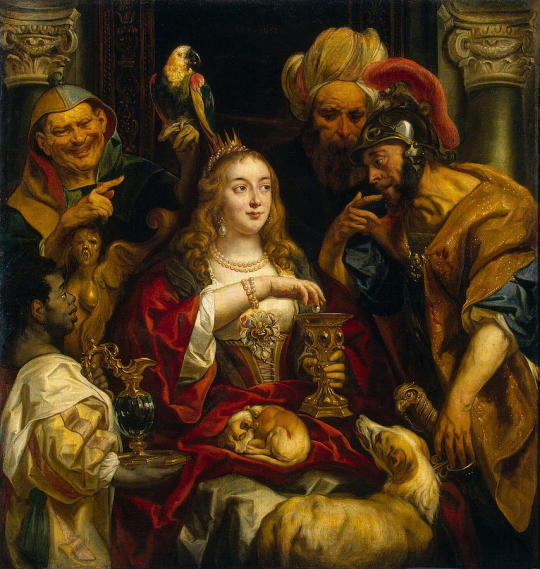
Cleopatra's Feast
Artist: Jacob Jordaens (Flemish, 1593–1678)
Date: 1653
Medium: Oil on canvas
Collection: Hermitage Museum, St Petersburg, Russia
Description
Jordaens. Cleopatra (68-30 BC), Queen of Egypt, was famed not only for her intelligence and her beauty, but also for her extravagant behaviour. Once, seeking to amaze with her wealth her beloved, the Roman commander Mark Antony, she dissolved a large pearl in a glass of vinegar, and then drank it down to the very last. Jordaens depicted the moment when Cleopatra drops the pearl earring into the vessel, while Mark Antony, his companion and a negro servant freeze in silent amazement, experiencing a mixture of envy, regret and admiration. Only the court jester shows with the gesture of his right hand and his grotesque grin the ridiculous nature of Cleopatra's wastefulness. The allegorical composition was seen as a judgment on Pride or Vanity, and this didactic subtext was typical of the Flemish school.
#jacob jordaens#cleopatra#feast#mark anthony#queen of egypt#17th century art#flemish painter#egypt#servant#pearl earring vessel#pride#vanity#ancient history
3 notes
·
View notes
Text
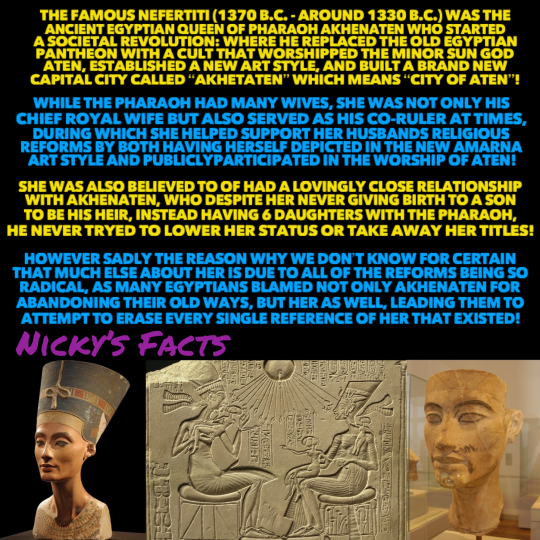
All hail Nefertiti, who turned her back on the old ways!𓆸
#history#nefertiti#ancient egypt#queen#akhenaten#womens history#akhetaten#royalty#egyptian queen#egyptology#historical figures#ancient egyptian history#amarna period#queencore#ancient#femininity#new kingdom#egypt#royal history#cult of aten#queen of egypt#kemetic#historical women#ancient history#nickys facts
2 notes
·
View notes
Text
So, I saw this image on Facebook, and it was supposedly showing what Queen Nefertiti would have looked like in real life:

Now, I thought this AI generated garbage was just truly terrible on a number of levels; first off, she looks wayyyyyy too modern - her makeup is very “Hollywood glamour”, she looks airbrushed and de-aged, and as far as I’m aware, Ancient Egyptians didn’t have mascara, glitter-based eyeshadows and lip gloss. Secondly, her features are exceptionally whitewashed in every sense - this is pretty standard for AI as racial bias is prevalent in feeding AI algorithms, but I genuinely thought a depiction of such a known individual would not exhibit such euro-centric features. Thirdly, the outfit was massively desaturated and didn’t take pigment loss into consideration, and while I *do* like the look of the neck attire, it's not at all accurate (plus, again, AI confusion on the detailing is evident).
So, this inspired me to alter the image on the left to be more accurate based off the sculpture’s features. I looked into Ancient Egyptian makeup and looked at references for kohl eyeliner and clay-based facial pigment (rouge was used on cheeks, charcoal-based powder/paste was used to darken and elongate eyebrows), and I looked at pre-existing images of Nefertiti (namely other reconstructions). While doing this, I found photos of a 3D scanned sculpture made by scientists at the University of Bristol and chose to collage the neck jewellery over the painting (and edited the lighting and shadows as best as I could).

Something I see a lot of in facial recreations of mummies is maintaining the elongated and skinny facial features as seen on preserved bodies - however, fat, muscle and cartilage shrink/disappear post mortem, regardless of preservation quality; Queen Nefertiti had art created of her in life, and these pieces are invaluable to developing an accurate portrayal of her, whether stylistic or realistic in nature.

And hey, while I don't think my adjustments are perfect (especially the neck area), I *do* believe it is a huge improvement to the original image I chose to work on top of.
I really liked working on this project for the last few days, and I think I may continue to work on it further to perfect it. But, until then, I hope you enjoy!
Remember, likes don't help artists but reblogs do!
#Nefertiti#Queen Nefertiti#Ancient Egypt#Facial Reconstruction#art#artist#digital artist#historical#history#historical figure#ancient egyptians#artistic interpretation#historial facial reconstruction#Neferneferuaten#Queen Neferneferuaten Nefertiti#illustration#digital art#digital illustration
8K notes
·
View notes
Text
#liz taylor#cleopatra#actress#beautiful#beautifulwoman#queen of egypt#fineart#fine art#black and white#illustration#redbubble#artist#tshirt#redbubble artist
0 notes
Text

"Queen of Egypt"
Photography: Nicoline Patricia Malina
Model: Zahara Davis
1 note
·
View note
Text
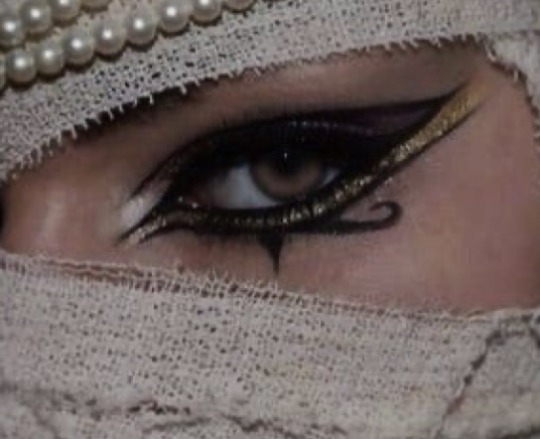
#ancient egypt#cleopatra#egyptian#egyptian aesthetic#egyptian antiquities#egyptian art#egypt#egyptian royalty#eqyptian architecture#queen of egypt
221 notes
·
View notes
Text

“First Queen II: Sabaku no Joō” Yoshitaka Amano 1990
295 notes
·
View notes
Text

guess who’s finally reading queen of the damned
#ft my own design of akasha!#i know she’s technically predynastic egypt but shshshshshshsh#cw partial nudity#cw blood#akasha#queen of the damned#interview with the vampire#the vampire chronicles
193 notes
·
View notes
Text




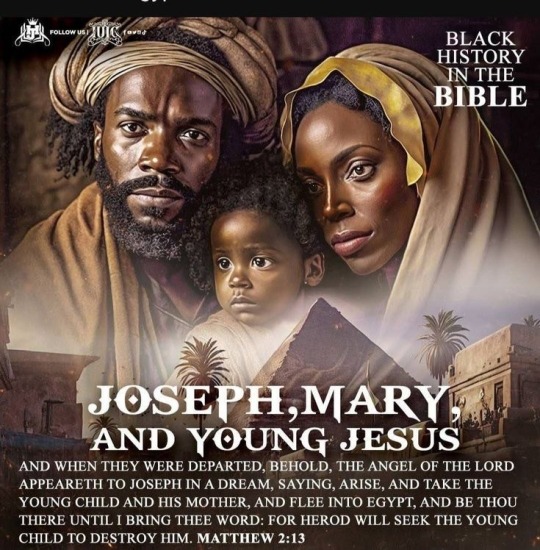
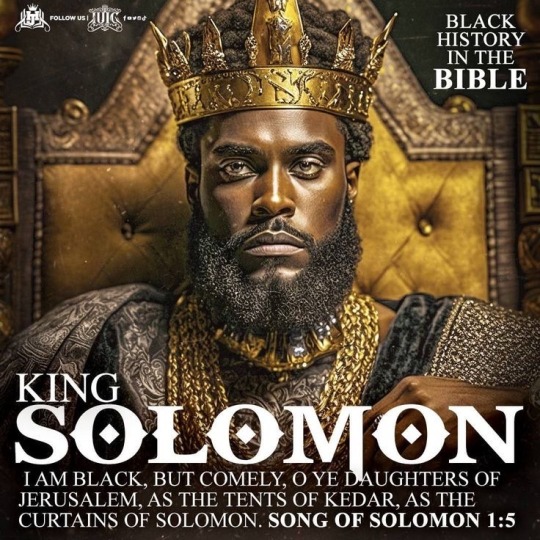

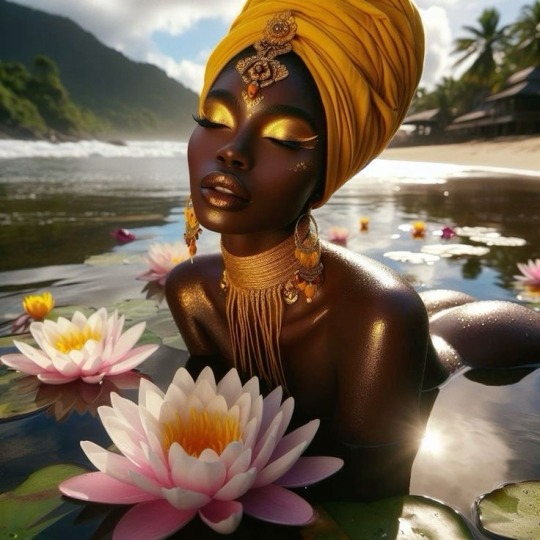

#black community#original photographers#black people#artwork#graphic design#black art#black power#black history#black culture#black family#black woman#black panther#black men#black history month#black knowledge#black love#blacklivesmatter#black representation#black relationships#black children#black king#black queen#black africans#africa fashion#egypt nt#egyptian art#african art
349 notes
·
View notes